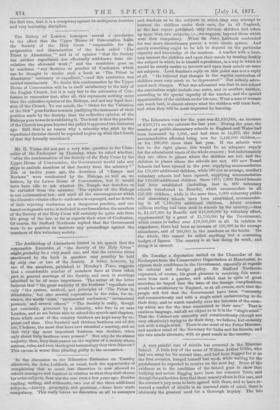The Bishop of London hereupon moved a resolution to the
effect that the Upper House of Convocation bolds the Society of the Holy Cross "responsible for the preparation and dissemination of the book called The Priest in Absolution,'" and is of opinion "that the Society has neither repudiated nor effectually withdrawn from cir- culation the aforesaid work ;" and the resolution goes on to condemn "any doctrine or practice of Confession which can be thought to render such a book as 'The Priest in Absolution' necessary or expedient,"—and this resolution was carried unanimously. No doubt this condemnation by the Upper House of Convocation will be in itself satisfactory to the laity of the English Church, but it is only fair to the advocates of Con- fession to remember that, after all, this represents nothing more than the collective opinion of the Bishops, and not any legal deci- sion of the Church. To our minds, the "Order for the Visitation of the Sick" goes further towards justifying the statement of their position made by the Society, than the collective opinion of the Bishops goes towards invalidating it. The truth is that the practice of the Church has gone beyond the policy it approved two centuries ago. Still, that is no reason why a minority who stick by the repudiated doctrine should be expected to give up what the Church of that day formally sanctioned.


































 Previous page
Previous page